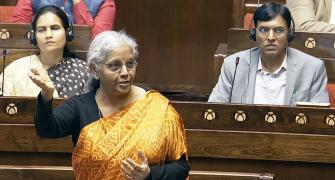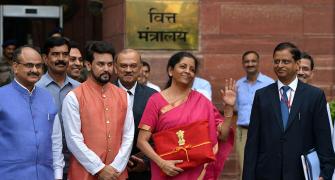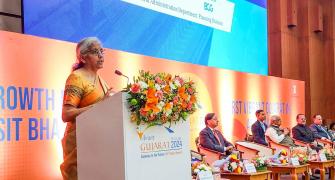The finance minister's assertion that industry should not expect any spectacular announcements in the 2024 interim Budget suggest that the electoral imperatives of more tax concessions or higher expenditure on welfarist programmes could be far less pronounced than they were before the 2019 interim Budget, expects A K Bhattacharya.

In the run-up to the presentation of the interim Budget for 2024-2025, two major issues have come under scrutiny.
One pertains to the scope and size of the fiscal space that the Union government currently enjoys in financing its expenditure plan for the next couple of years.
The second issue is about the nature of the government's political imperative for announcing any fresh expenditure plan to secure the much-needed electoral dividends during the forthcoming general elections.
It will be instructive to assess both the issues even as Finance Minister Nirmala Sitharaman prepares to present her first interim Budget.
Growth assumptions are critical inputs for framing the government's fiscal consolidation strategy.
The First Advance Estimates (FAE) of India's gross domestic product (GDP) was released last week, placing the nominal size of the economy for 2023-2024 at Rs 296.58 trillion, showing a growth rate of 8.9 per cent.
This was a huge deceleration. The nominal size of the economy in 2022-2023 had grown by over 16 per cent.
But despite a relatively low rise in nominal GDP in 2023-2024, the Centre's net tax revenues have maintained a growth rate of over 17 per cent (April-November 2023).
This implies that tax buoyancy has improved. What's more, it appears the target of 11 per cent net tax revenue growth for the full year of 2023-2024 is set to be exceeded.
On the expenditure side, the Centre's revenue as well as capital spending has seen a perceptible slowdown in recent months.
In the first half of 2023-2024, revenue expenditure grew by almost 10 per cent.
But by the end of November, this growth rate slowed to 3.5 per cent.
Clearly, revenue expenditure growth is being gradually aligned to what had initially appeared to be an ambitious full-year target of 1.4 per cent.
Capital expenditure too had grown by 43 per cent in the first half of 2023-2024, but slowed to 31 per cent for the April-November period of the current year.
This is even lower than the annual growth of 36 per cent projected for the full year.
Even though there will be some additional expenditure pressure in the last three months of the year because of the extension of the free food grain scheme and other social welfare programmes, there are reasons to believe that the fiscal deficit target of 5.9 per cent of GDP will be met during the current year.
Non-tax revenues will be more than the Budget projections and should be able to make good the shortfall in the government's disinvestment proceeds.
A lower nominal growth rate of 8.9 per cent for 2023-2024, compared to the Budget premise of 10.5 per cent, could exert some extra pressure on government finances, but given the revenue buoyancy and slowing expenditure growth, the stated fiscal deficit target appears achievable.

Where the low nominal growth rate of 8.9 per cent for 2023-2024 will cause concern for the Budget makers is in its potential impact on the assumptions for 2024-2025.
Remember that Ms Sitharaman in the last few years has displayed an admirable degree of conservatism in projecting the government's revenue and expenditure growth, apart from introducing transparency in accounting by including in the Budget all expenditure that earlier was kept out of Budget calculations.
The last few years have seen no recourse to such off-Budget spending.
But now, a relatively low nominal GDP growth projection could become a constraint.
The interim Budget for 2019-2020 was helped by an unusually rosy nominal GDP growth projections of over 12 per cent for 2018-2019.
Based on that number, the interim Budget five years ago had assumed a nominal economic growth of 11.5 per cent for 2019-2020.
Indeed, the full Budget for 2019-2020 had raised the nominal economic growth projection to 12 per cent, even though the Second Advance Estimates had brought down its GDP growth rate for 2018-19 to 11.5 per cent.
As it turned out, the actual nominal GDP growth rates in 2018-2019 and 2019-2020 were 10.6 per cent and 6.4 per cent, respectively.
The consequences of such over-optimism were evident in the final fiscal deficit numbers for 2018-2019 and 2019-2020.
Against a Budget Estimate of 3.3 per cent for each of the two years, the actual deficit turned out to be 3.4 per cent and 4.6 per cent, respectively.
This slippage took place even after the Budget numbers had resorted to the unhealthy practice of off-Budget expenditure.
The finance ministry today is a lot different from the finance ministry of 2019.
The FAE indicating a nominal GDP growth of only 8.9 per cent for 2023-2024 will naturally restrain the current finance ministry from projecting a significantly higher nominal size of the Indian economy in 2024-2025.
Recent reports suggest that the finance ministry may settle for 10.5 per cent nominal growth for 2024-2025.
Improved tax buoyancy might, nevertheless, help the Centre project a decent double-digit revenue growth for 2024-2025, but this may not be enough to both step up its capital expenditure and bring down the fiscal deficit.
If the Centre must bring its deficit down from 5.9 per cent of GDP in the current year to 4.5 per cent by 2025-2026, the available fiscal space is limited.
A reduction of 1.4 percentage points in the next two years will be a challenging task.
Note that despite healthy revenue growth in the post-Covid years (2022-2023 and 2023-2024), the government had to spend more, and its fiscal deficit could contract by only 0.8 percentage points in these years.

The challenge ahead could get more complicated because of the general elections that would be held in May 2024.
The big question is whether the political leadership will push the finance ministry to loosen its purse strings in the days before the polls, through higher expenditure allocations and tax giveaways in the interim Budget.
However, the finance minister's assertion that industry should not expect any new spectacular announcements in the interim Budget and the ruling party's electoral victory in the recent assembly elections suggest that the electoral imperatives of more tax concessions or higher expenditure on welfarist programmes could be far less pronounced than they were before the interim Budget in 2019.
That could well pave the way for a fiscally prudent interim Budget for 2024-2025.
If that happens, the ruling party's growing political capital could at last create the base for robust economic reforms in the days ahead.
With less baggage or burden of concessions and populist schemes, the full Budget for 2024-2025, to be presented after the elections, could build on the current tax buoyancy through steps to widen the tax base and by expediting non-tax revenue flows with a renewed focus on asset monetisation and privatisation.
Feature Presentation: Aslam Hunani/Rediff.com










